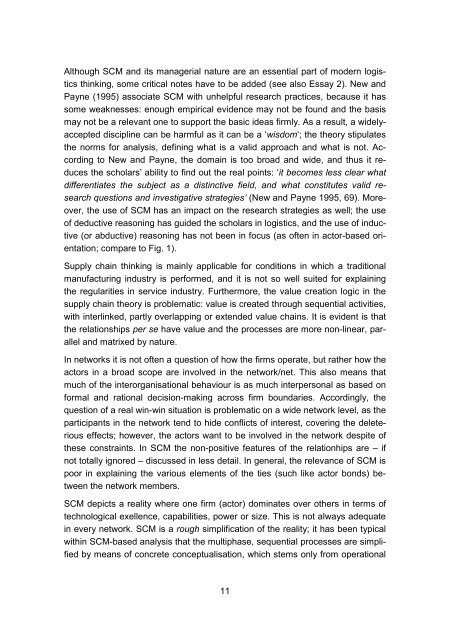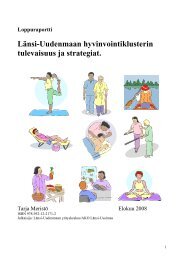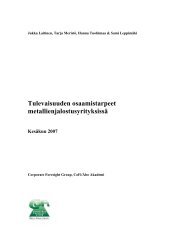849954 sisus
849954 sisus
849954 sisus
Create successful ePaper yourself
Turn your PDF publications into a flip-book with our unique Google optimized e-Paper software.
Although SCM and its managerial nature are an essential part of modern logistics<br />
thinking, some critical notes have to be added (see also Essay 2). New and<br />
Payne (1995) associate SCM with unhelpful research practices, because it has<br />
some weaknesses: enough empirical evidence may not be found and the basis<br />
may not be a relevant one to support the basic ideas firmly. As a result, a widelyaccepted<br />
discipline can be harmful as it can be a ‘wisdom‘; the theory stipulates<br />
the norms for analysis, defining what is a valid approach and what is not. According<br />
to New and Payne, the domain is too broad and wide, and thus it reduces<br />
the scholars’ ability to find out the real points: ‘it becomes less clear what<br />
differentiates the subject as a distinctive field, and what constitutes valid research<br />
questions and investigative strategies‘ (New and Payne 1995, 69). Moreover,<br />
the use of SCM has an impact on the research strategies as well; the use<br />
of deductive reasoning has guided the scholars in logistics, and the use of inductive<br />
(or abductive) reasoning has not been in focus (as often in actor-based orientation;<br />
compare to Fig. 1).<br />
Supply chain thinking is mainly applicable for conditions in which a traditional<br />
manufacturing industry is performed, and it is not so well suited for explaining<br />
the regularities in service industry. Furthermore, the value creation logic in the<br />
supply chain theory is problematic: value is created through sequential activities,<br />
with interlinked, partly overlapping or extended value chains. It is evident is that<br />
the relationships per se have value and the processes are more non-linear, parallel<br />
and matrixed by nature.<br />
In networks it is not often a question of how the firms operate, but rather how the<br />
actors in a broad scope are involved in the network/net. This also means that<br />
much of the interorganisational behaviour is as much interpersonal as based on<br />
formal and rational decision-making across firm boundaries. Accordingly, the<br />
question of a real win-win situation is problematic on a wide network level, as the<br />
participants in the network tend to hide conflicts of interest, covering the deleterious<br />
effects; however, the actors want to be involved in the network despite of<br />
these constraints. In SCM the non-positive features of the relationhips are – if<br />
not totally ignored – discussed in less detail. In general, the relevance of SCM is<br />
poor in explaining the various elements of the ties (such like actor bonds) between<br />
the network members.<br />
SCM depicts a reality where one firm (actor) dominates over others in terms of<br />
technological exellence, capabilities, power or size. This is not always adequate<br />
in every network. SCM is a rough simplification of the reality; it has been typical<br />
within SCM-based analysis that the multiphase, sequential processes are simplified<br />
by means of concrete conceptualisation, which stems only from operational<br />
11








